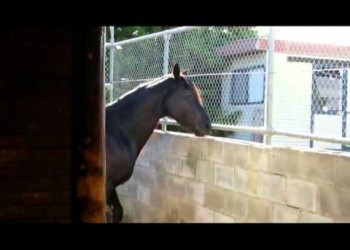EDV Articles
Browse our informative articles on horse care and treatment written by EDV vet members as published in top equine publications.

Advances in dental veterinary practice mean that congenital dental abnormalities such as malocclusion (parrot and sow mouth), cleft palate and wry nose, which severely affect a horse’s ability to graze efficiently, can now be corrected. The key lies in identifying these issues early enough in the foal's development.

Common stereotypies in the horse include wind-sucking, crib-biting, weaving, box-walking, pawing, head-nodding and tongue rolling. These behaviours often cause confusion, concern and annoyance to horse owners, but do they affect horse health, and once acquired, should horses be prevented from doing them?

The majority of horses examined will have some form of periodontal disease. Periodontal disease is defined as disease of the support structures of the tooth (i.e. the periodontium – the bone of the socket, the periodontal ligament running form tooth to bone, the cementum of the “root” and the gum or gingiva) and can be subdivided into two distinct forms – gingivitis and periodontitis.
Gingivitis is a reversible inflammation of the marginal gingiva associated with the presence of bacterial plaque and food particles. If the gingival sulcus (the small gap between the tooth and the gum) is thoroughly cleaned, the gingivitis will resolve. Gingivitis is a precursor to periodontitis. (Figure 1.)
Periodontitis is a more severe inflammation of the supporting structures and usually involves bone loss. It is usually irreversible but potentially controllable. The periodontitis associated with eruption of the teeth will often resolve once the initial eruption is completed.

It has often been remarked "no feet no horse" and it is equally true to say "No teeth no horse". As horses are now living longer and as we have more and more "Geriatric" horses it is important to understand the dental needs of older horses. Horses have a different type of tooth to humans, one that is designed to wear down over time, so the teeth of horses have a lifespan and as horses reach their twenties and thirties their teeth will begin to wear down. The surface that is then available for the horse to pick up food , chew and grind is often very poor, so one of the most important aspects of geriatric dental care is to ensure your horse has a good grinding surface going into old age, in other words don't wait until you have an old skinny horses to think about looking after...

If you own horses then you should be familiar with the term periodontal disease, and yet chances are you haven't heard of it. This disease is the most common disease affecting horses, with around 70% of horses suffering from its effects. So what is this important disease, what are its effects and how is it diagnosed and treated? Well firstly let's explain the word periodontal, perio means around and dontal means tooth so periodontal disease is disease of the structures that support teeth; these include the gum, the bone and the periodontal ligaments. It is a disease which can affect horses of all ages, and the author has observed life threatening periodontal disease in horses as young as 18mths of age.
The periodontal ligament
The periodontal ligament plays a very important role in the horse's mouth, it is responsible for stabilising the tooth against the forces it experiences during chewing but also...

A horse has many teeth, of several types and this has been discussed in previous articles. One that commonly causes alot of confusion for horse owners is the wolf tooth.
Wolf teeth are a vestigial tooth (this means they are a tooth that is no longer necessary) and can be thought of abit like wisdom teeth in people. Fossil records show that the ancient ancestor of the modern horse (Equus Caballus) was the size of a dog and survived on a very different diet to today's horses. Eohippus or the "Dawn horse" ate low bushes and shrubs and had small cheek teeth similar to those of humans. Whereas modern horses generally have six cheek teeth in each arcade Eohippus had seven. As the horse's diet changed (to grass) and horses grew bigger so their teeth increased in size to provide a larger chewing and grinding surface. When this...

Equine dentistry by vets in this form has existed for a long time, but with steadily improving techniques and equipment. It is only ignorance that has prevented the widespread uptake of proper equine dentistry implemented by trained, registered equine vets by horse owners.
© 2010 -2026 Equine Dental Vets. ALL Rights Reserved.
